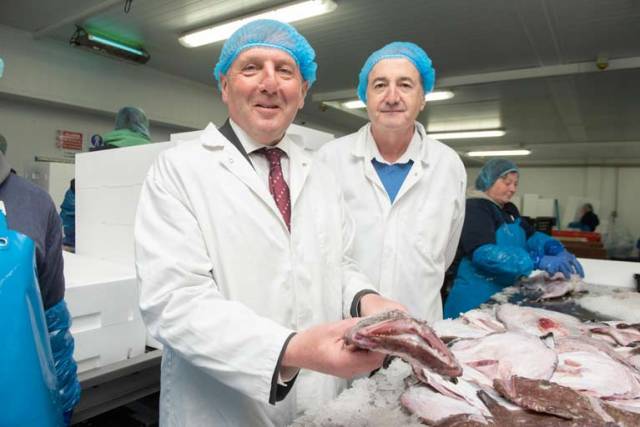Minister for Agriculture Food and the Marine, Michael Creed T.D. today announced the award of €2,369,801 in grants to 17 seafood enterprises in 9 different counties under his Department’s European Maritime and Fisheries Fund Operational Programme for the seafood sector. The grant awards will support total investment in these companies of €6,472,909 in the aquaculture and seafood processing sectors.
Minister Creed said, “I am delighted to say that, despite uncertainties created by Brexit over the past 2 years, there is still strong confidence in our seafood sector about its future growth prospects. The 17 seafood enterprises that are investing €6.5 million this year with assistance from the Department of Agriculture, Food and the Marine’s European Maritime and Fisheries Fund supported Programme are evidence of that strong confidence in the sector and the Government is supporting that confidence. These companies are seizing the market opportunities that are there in abundance for quality Irish seafood products. This is particularly true for companies like Keohane Seafoods from Cork, which is undertaking a major €3 million investment to double its salmon production capacity at its plant in Bantry.”
Creed added, “My Department is assisting ambitious seafood enterprises with many exciting growth projects through generous EMFF financial supports, available through BIM for seafood enterprises to grow their output, add value to their products and develop and diversify their markets worldwide. In this announcement, Seafood companies in Cork, Kerry, Clare, Galway, Mayo, Donegal, Louth and Monaghan are being supported to drive forward the development of their companies with innovation and technological development, thereby creating further value-added from our high-quality primary seafood products”.
The grants are co-funded by the Government of Ireland and the European Union and are subject to terms and conditions.
Grant approvals - Sustainable Aquaculture Scheme
|
Beneficiary |
Location |
Project |
Total Investment € |
EMFF Grant € |
|
Bantry Mussels Harbour Limited |
Bantry Cork |
Upgrade of boat’s engine room with twin keel cooled engines and a 3 phase generator. |
162,068 |
64,827 |
|
Curraun Fisheries Limited |
Mulranny Mayo |
Modernisation of salmon farm management systems. |
187,808 |
75,123 |
|
Ocean Farm Limited |
Killybegs Donegal |
Upgrade of salmon farm technology. |
1,175,202 |
470,081 |
|
Top Oysters Limited |
Cromane Kerry |
Purchase of a flat bottom boat and oyster production equipment |
93,532 |
37,413 |
|
Michael Lydon |
Galway |
Upgrade to continuous longline system |
45,099 |
18,039 |
|
Atlantic Greenway Oysters Ltd |
Westport Mayo |
Capacity increase of oyster farm |
40,553 |
16,221 |
|
Caragh Clams Limited |
Cromane Kerry |
Fourth phase development of oyster farm |
24,428 |
9,771 |
|
Cromane Seafoods Limited |
Cromane Kerry |
Purchase of a flat bottom boat and oyster trestles |
88,752 |
35,500.88 |
|
Hugh O'Malley |
Achill Island Mayo |
Capacity increase in oyster production & new equipment purchase |
81,021 |
32,408 |
|
TOTAL |
|
1,898,463 |
759,383 |
Grant approvals – Knowledge Gateway Scheme
|
Beneficiary |
Location |
Project |
Total Investment € |
EMFF Grant € |
|
Institute of Technology Tralee |
Tralee Kerry |
Development of an Oyster Farm Management System & Data Warehousing Solution |
318,001 |
318,001 |
Grant approvals - Seafood Processing Capital Investment Scheme
|
Beneficiary |
Location |
Project |
Total Investment € |
EMFF Grant € |
|
Seafood Processors Ltd |
Omeath Co Louth |
Upgrade of pre-pack fish line |
16,344 |
4,903 |
|
Keohane Seafoods Unlimited |
Bantry Co Cork |
Machinery & System Processing for Smoking Plant and Salmon Line |
3,000,000 |
900,000.00 |
|
Bio-marine Ingredients Ireland Ltd |
Castleblayney Co Monaghan |
Installation of Odour Abatement System to reduce the impact on the environment and to lead to new and improved products |
529,975 |
79,496 |
|
Castletownbere Fishermens Co-operative Society Ltd |
Castletownbere Co Cork |
Develop an oven ready Megrim product for the Spanish Market |
236,118 |
70,835 |
|
TOTAL |
|
3,782,437 |
1,055,234 |
Grant approvals - Seafood Innovation & Business Planning Scheme
|
Beneficiary |
County |
Project |
Total Investment € |
EMFF Grant € |
|
Breizon Teo |
Rossaveel Co Galway |
R & D Project to Pack Irish Prawns for French Market |
10,009 |
5,004 |
|
Bio-marine Ingredients Ireland Ltd |
Castleblayney Co Monaghan |
Comparison of Proteins in terms of functionalities |
13,916 |
6,958 |
|
Keohane Seafoods Unlimited |
Bantry Co Cork |
Advisory Services to enhance management systems |
39,600 |
19,800 |
|
TOTAL |
|
63,525 |
31,762 |
Grant approvals – Seafood Scaling & New Market Development Scheme
|
Beneficiary |
Location |
Project |
Total Investment € |
EMFF Grant € |
|
Jade Ireland Seafood Ltd |
Sofrimar Kilmore Quay Co Wexford McBride Fishing Downings Co Donegal Shellfish Ireland Castletownbere Co Cork |
Development of China, Hong Kong & Taiwan Markets |
209,700.00 |
104,850.00 |
|
Connemara Producers Group |
Connemara Seafoods Frozen Ltd Westport Co Mayo Oilean Mara Teo. Lettermore Co Galway |
Market development in Asia |
201,143.00 |
100,571.00 |
|
TOTAL |
|
410,843.00 |
205,421.00 |



























































